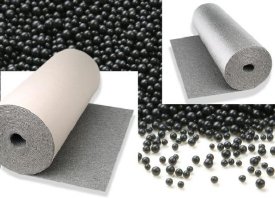Jan 5 2010
The insulation material manufacturer Saarpor, Germany is now using Neopor®, BASF’s expandable polystyrene (EPS), in its Climapor® insulation wallpapers. The new wallpapers show an insulation performance which is up to 20 percent better than that of conventional wallpapers.
 Insulation wallpaper made from BASF's Neopor for retroactive renovation
Insulation wallpaper made from BASF's Neopor for retroactive renovation
They save heating costs, improve the indoor climate and can be used as a wallpaper primer. Neopor is the advanced version of the classic insulation material Styropor (EPS): it contains special graphite particles which act like mirrors in reflecting the thermal radiation and thus reduce heat losses. The new Climapor insulation wallpapers will be shown at the Heimtextil trade fair, which will be taking place in Frankfurt, Germany from January 13 to 16, 2010.
Different versions for subsequent renovation
Climapor can be used to insulate rooms retroactively and with little effort by do-it-yourself. The insulation wallpapers, which are four millimeters thick, are available in different versions, all of which meet the requirements of thermal conductivity class 032 and of European fire class E in accordance with DIN EN 13501-1. They can resist temperatures of up to 75°C and can also cover cracks and uneven areas. The wallpaper is stuck to the wall using a commercially available Styropor adhesive.
The aluminum-laminated version of Climapor is covered with a heat-reflecting aluminum foil. It is particularly suitable for insulating radiator alcoves. The wallpaper thus helps to heat up the room more quickly. The version which is laminated with pasteboard is used for insulating inside walls. It creates walls which are warm to the touch and is used as the base layer for all kinds of wallpaper. An insulation wallpaper which is four millimeters thick has the same insulating effect as a wall which is made from 85 mm of solid brick or 98 mm of sandy limestone or 262 mm of standard concrete.
Insulation material for energy-efficient applications
BASF manufactures Neopor as small black beads of expandable polystyrene (EPS). Processors foam the beads and process them into silver-gray blocks and molded parts for various applications, in particular for insulating facades, roofs and floors. Insulation materials made from Neopor can both meet the standards required in passive-house construction and save at least 40 percent of cooling energy for residential buildings in hot climates.